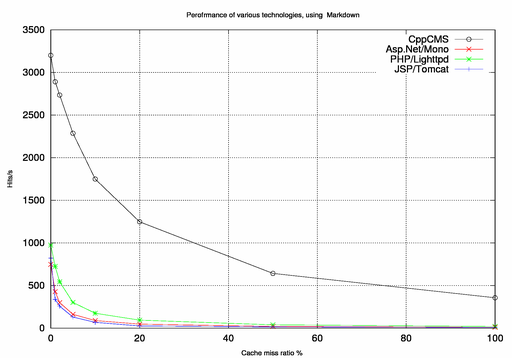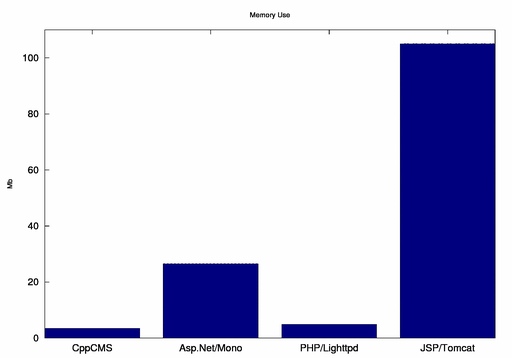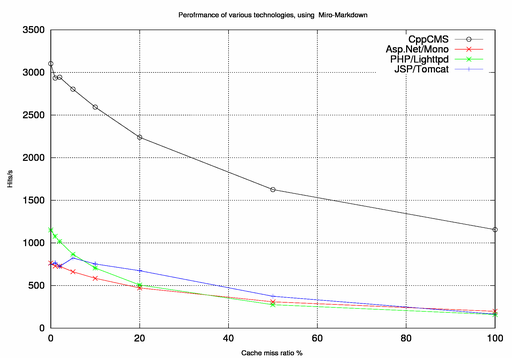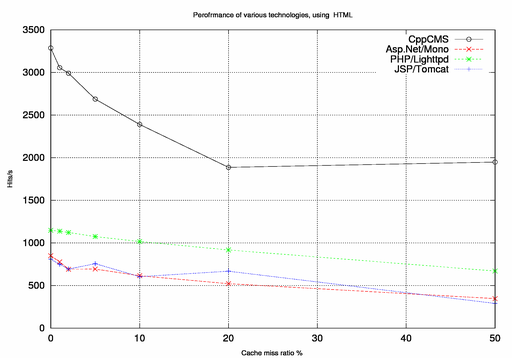CppCMS 0.99.5 released
Changelog:
New Features:
New XSS Filer. It is very new and experimental feature. It allows to validate and filter the HTML input that comes from untrusted source to ensure that it does not include malicious code. This is very common case when we want to integrate in the applications tools like TinyMCS.
It is based on white-list of tags and HTML attributes values that are allowed to be included.
The filter and filtering rules can be found under cppcms::xss namespace.
Currently XSS filter is used only on CppCMS's wiki. So you are welcome to try to bypass it editing the wiki's Sandbox and if you succeed please report me immediately.
Support Windows Vista/Windows 7 API. It allows to build CppCMS on Windows without pthreads-win32 library.
Note: you need to use CMake's option:
-DUSE_WINDOWS6_API=ONas by default CppCMS targeted for Windows XP and above.Changed default number of worker threads to depend on number of physical CPUs
Bugs Fixes:
- Fixed incorrect mutex configuration that caused deadlocks in preforking mode
- Some fixed in CMake scripts that caused libraries not being found in some situations.
- Some fixes to allow CppCMS to work with uclibc
- Fixed problem in URL dispatching to sub application that caused inability to redefine main function of them
- Some bug fixes in response handling
SQL Connectivity Libraries released
Today two SQL Connectivity libraries were released.
- Released first version 0.0.1 of CppDB library - new powerful SQL Connectivity library written in C++.
Released updated version 0.0.4 of DbiXX - libdbi wrapper. It was also deprecated in favor of CppDB.
It would be continued to be updated with bug fixed and probably small features, but the support will be discontinued withing a year or two, depending on the users needs.
Downloads are available in usual place: https://sourceforge.net/projects/cppcms/files/
Documentation can be found at: http://art-blog.no-ip.info/sql
Why CppDB? What is New There?
New SQL Connectivity library was introduced. There were many reasons for this step:
- Support of both prepared and unprepared statements and transparent prepared statements caching.
- Connection Pooling
- Static and Dynamic linking of the modules - very important for deploy.
- Native windows support including MSVC compiler.
- Removal of additional intermediate layer between the C++ code and native SQL client - libdbi.
- Performance.
- Ensure thread safety (which libdbi was lacking on some platforms - windows)
What is new in DbiXX
- Correct overloading for all integer types
- Access to underlying dbi data structures from all classes
- Support of connection string
- Support of getting driver name (for conditional coding)
- Full Doxygen documentation
- Some code cleanup - to make it locale safe
Why not other libraries like SOCI or QtSql
- QtSql is very heavy depends on Qt framework and does not fit well to modern C++ design (as it provides their own classes for everything - QString etc)
- SOCI - the development cycle is very slow, the quality of some primary FOSS RDBMS drivers is very low, and general disagreement about several concepts.
CppCMS 0.99.4 released
New Features:
- Added support of OpenSSL as alternative to Gcrypt library for AES cookies encryption
- Added support of strength options of AES and better selection of hash for HMAC.
- Added support of recording and showing stack backtrace from thrown exceptions - for better debug-ability of the code.
- Added support of daemonization - running as service under Unix, including options: switch to unprivileged user and
chrooting to specified directory. - Added support of reset_session function in session_interface that forces allocation of new session id - to be used for preventing session fixation.
- Added support of suppression of error messages by default - the exception information is not shown by default to user.
- Improved session ids generation security.
- Improved performance of generation of random numbers under Windows
- Improved Content-Type header handling
Bug Fixes:
- Fixed accidental crashes caused by dangling reference.
- Fixed bug incorrect using of non-blocking sockets caused incomplete writes on long outputs
- Fixed memory leak in AES encryption backend
- Fixed incorrect handing of script name in HTTP server.
- Fixed incorrect shutdown handling when working in prefork mode caused deadlock between parent and child on exit.
- Fixed bug in booster::streambuf caused accidental character loss, added handing of putback.
- Fixed incorrect error handing in http_response class that could cause thread-pool to run out of threads.
- Various platform related test fixes
The download is available in usual place: https://sourceforge.net/projects/cppcms/files/
CppCMS Nightly Tests
Hello All,
In order to simplify CppCMS release procedure and ensure that current SVN trunk it not got broken on platforms that are used less frequently the night build and test were set up.
Each night svn-trunk is tested with different compilers and platforms. The full test matrix in not complete yet, but most important platforms and compilers are tested (or actually the plafroms that can be tested relatievly easily)
It is expected to be extedned more in future.
Thanks to VirtualBox for simple and convinient virtualization solutions.
CppCMS benchmarks vs Java, C#, PHP
Long time ago I had posted a benchmarks comparing CppCMS based blog and PHP based one.
I wanted to compare real life applications with each other. For a long time I had been searching for similar applications in several technologies doing very similar jobs in leading technologies: PHP, Asp.Net and Java/JSP. The last two were particularly important as they use static type system and "compiled" languages as C# and Java that are known to be faster then other dynamic typed languages like PHP, Python, Ruby and Perl popular in web development.
Setup
Unfortunately I had failed to find such application, so finally I decided to write something representative and small on my own an application with following requirements:
- Uses simple time-out based page caching
- Uses MySQL and the database and keeps open connections in pool.
- For each request access to database (if page is not cached), fetches the page content and comments for "sample article" in blog.
- Converts text to HTML using a markdown filter and displays it on page.
I used following technologies:
CppCMS:
Version: 0.99.3
MySQL Connection: dbixx/libdbi library using libmysqlclient
Markdown library: discount
Connection: internal HTTP serverPHP
Version: 5.2.6
MySQL Connection: internal driver
Markdown library: PHP-Makrdown
Connection: Lighttpd 1.4.19 + FastCGI
Bytecode Cache: XCacheAsp.Net/Mono
Version: 2.6.7
MySQL Connection: Connector/Net
Markdown library: MarkdownSharp
Connection: internal HTTP server XSP (found to be much faster than fastcgi server)JSP/Tomcat
Version - Tomcat: 6.0.18
Version - Java: Sun Java 1.6.0_12
MySQL Connection: Connector/J
Markdown library: jmd-0.8.1
Caching: oscache 2.4.1
Connection: HTTP
I tested following parameters:
- Pages per seconds generation for different cache hit/miss ratio: stating from 0% miss ratio up to 100% miss ratio.
- Memory usage
For each test the application was "warmed up" with 100 requests to fill the cache, and then 1000 request with max concurrency of 5 request are done, while certain percent of them is new pages and the other are taken from "warmed up" once.
Notes:
I used the fastest Markdown implementation I had found.
C# implementation is the same one that http://stackoverflow.com uses - it is actually heavily optimized implementation based on older C# implementation
The Java implementation is based on the above C# and the fastest one I had found.
Discount is the fastest C implementation of markdown that I had found.
Results:


Summary
- C#, Java and PHP implementation behave very similarly and without significant differences.
- The memory usage of Java/Tomcat and Mono/Asp.Net was significantly higher - up one or two orders of magnitude in comparison to CppCMS and PHP
- Surprisingly PHP behaves very well, in comparison to "compiled" languages like Java and C#.
Revisiting
After doing some profiling it was clear that C implementation of Markdown was significantly faster then all other implementations. So I decided to create my own mini-markdown that make some basic handing of titles, lists, paragraphs and quotes at one level only. That is very simple syntax but implemented similarly in all 4 languages using same algorithm.
The results were following:

The difference between CppCMS and other implementations was still significant but still much smaller then the difference between real markdown implementation. So the performance difference was less dramatic.
2nd Revision
And in the last revision I decided not to use any text filters by fetch ready HTML formatted content from DB and display it on the web as is.
Such comparison actually profile the most basic stuff:
- Caching
- SQL Connection
- Request/Response handling
And would ignore hundreds lines of code used in any web applications responsible for the actual business logic.

Conclusions
- Using C++ with CppCMS provides significant performance gains in developing web applications even in very basic case.
- The performance is effected not only by the framework itself but also by many other libraries that are in use. Using highly optimized C and C++ libraries may give significant performance gain in many cases.
- Such called "jit-compiled" languages as C# and Java and the frameworks based on the use significant amount of memory and still provide much lower performance then the one that can be achieved using real compiled languages like C++.
- It is good to remember that these benchmarks are still quite synthetic ones and in real life the actual performance depend on many factors - but using high quality and high performance libraries available for C++ have significant impact on performance.
Results Data
Markdown
---------
Miss % CppCMS Mono PHP JSP/Tomcat
0 3200.73 747.164 974.142 821.887
1 2891.2 427.727 724.173 337.736
2 2734.69 300.017 544.162 257.44
5 2285.95 162.686 301.507 130.023
10 1749.14 89.4447 174.724 68.5387
20 1247.86 47.7347 93.7919 25.7081
50 642.769 19.8311 38.979 15.1298
100 356.968 9.77116 20.1892 7.96328
Mini-Markdown
---------
Miss % CppCMS Mono PHP JSP/Tomcat
0 3103.14 763.222 1152.63 744.72
1 2933.97 728.971 1076.38 765.599
2 2944.42 726.338 1016.42 724.869
5 2804.44 661.613 866.32 822.927
10 2592.99 584.725 705.465 753.218
20 2239.03 471.576 507.021 674.488
50 1625.5 309.443 274.962 374.26
100 1156.09 197.123 159.974 164.515
HTML
-----
Miss % CppCMS Mono PHP JSP/Tomcat
0 3286.51 849.849 1147.21 808.038
1 3055.53 776.305 1137.35 748.829
2 2991.02 691.502 1122.88 693.439
5 2687.84 693.257 1074.22 756.618
10 2390.12 615.311 1016.27 604.452
20 1886.69 521.467 917.225 668.23
50 1947.93 346.672 669.693 289.656
System and Hardware
- OS: Linux, Debian Lenny, 64 bit
- Hardware: AMD Athlon XP 3000, 64 bit, 1GB memory
Related:
Code
The Code can be downloaded from there. note, to run it you will need to have some libraries installed and configure some hardcoded paths to make it run.
more...
